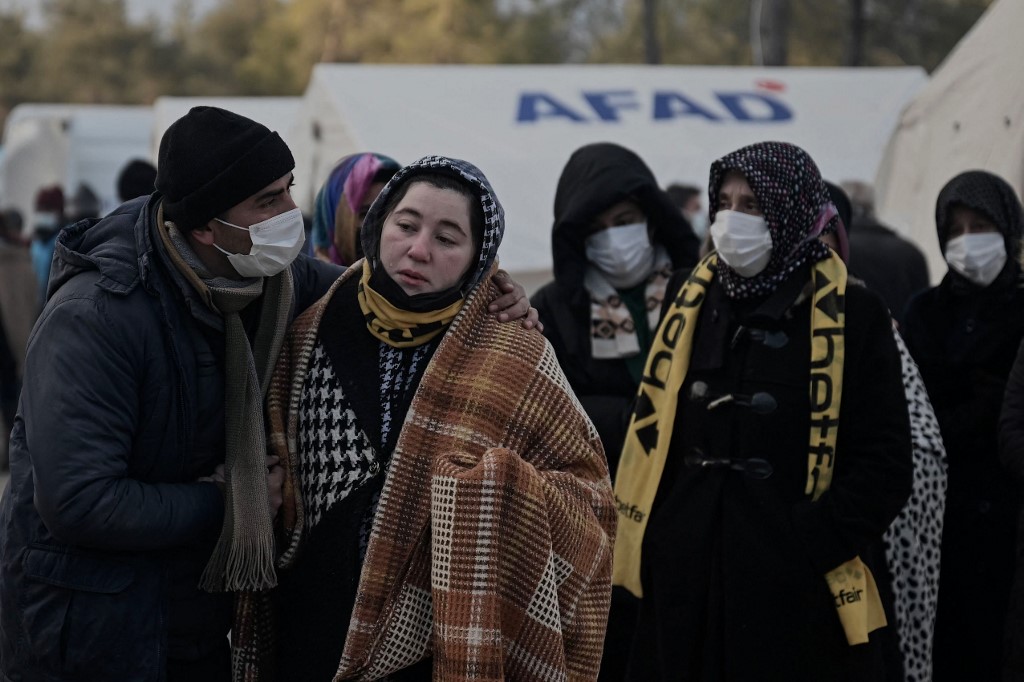Eyes red, features drawn, Fidan Turan looks lost as she stands in the middle of the street, wondering whether she should leave her devastated Turkish city or stay through its post-quake recovery.
The building she lives in seems to have held up better than those of her neighbors in Antakya, a historic center near the Syrian border, framed by mountains and dotted with ancient mosques.
Her metal door stood strong, and the windows are still in place. Even the air conditioner is hanging in there, only showing a few cracks from Monday’s 7.8-magnitude tremor.
But many who survived the disaster fear another big jolt.
More than 1,600 aftershocks of varying force have since rattled the region, adding to a death toll that has passed 20,000 in Turkey and surpassed 3,000 in Syria.
Standing on the street and gazing at her fourth-floor flat, Turan doesn’t know which way to turn.
“When I see the destroyed buildings, the bodies, it’s not that I can’t see where I will be in two or three years — I can’t imagine where I’ll be tomorrow,” said the youthful-looking pensioner, a tear glistening in her eye.
“We’ve lost 60 of our extended family members,” she said. “Sixty! What can I say? It’s God will.”
‘What God allows’
Her family home in a nearby village is not an option. Survivors told her it has been destroyed.
“Where can we go?” she asked, her voice broken.
Her son İnayet stared glumly through his blue glasses and tried to see a way out.
“It is still possible to rebuild here,” said the 35-year-old psychologist. “The state has the power to do it.”
But for now, “hundreds of people are on the street, sleeping on benches, in parks. We must find a solution,” he said, showing hints of anger and despair.
Crossing a street to the south of the Turan family’s apartment, a water purifier in his arm, Mustafa Kaya is escorting his wife, who is tugging a suitcase with one hand and their daughter with the other.
Living out of a tent since Monday, he has just fetched some belongings stored at the entrance to their ruined house. He would not dare step inside for fear of another big shake.
“We don’t know where we’ll be in a month or a year,” he said with an air of resignation.
“We will do what the government says, what God allows.”
His immediate plan is to go check on his brother in İstanbul to see if he might be able to put them up for a bit.
“But we are not sure how we will get there,” Kaya said.
‘This is our home’ –
Hatice Süslü, 55, has even fewer options.
She has nothing now but a tent in a public garden, where multitudes are camping out day and night on the frozen ground.
Some have rescued a loose mattress from the surrounding wreckage. Many, wrapped in blankets, warm themselves in front of little grills from the morning chill.
“I have no idea what we’re going to do. We will wait for a few more days before deciding,” Süslü said.
“Those who died have been freed. But those who remain, what will become of them?”
She paused and pondered, but found no solution.
“There is nothing to say. Life is over.”
Mehmet Ali Tüver, 35, was less fatalistic. He had managed to secure a shed, which he covered with plastic tarpaulins to keep out the cold.
“Everyone is trying to run away somewhere,” he said. “But this is our home. We can’t abandon it.”
© Agence France-Presse
